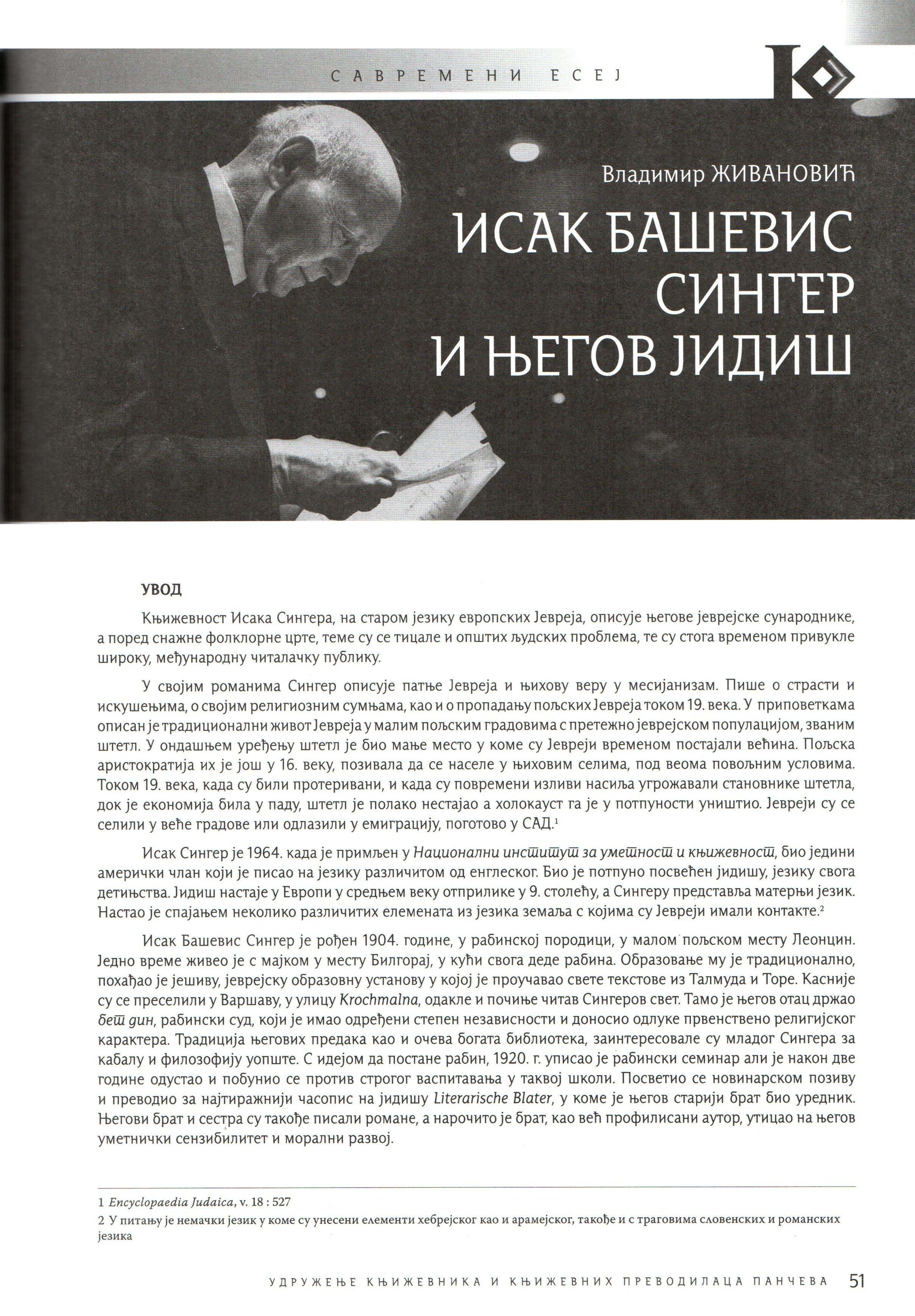Приказ основних података о документу
Isak Baševis Singer i njegov jidiš
Isaac Bashevis Singer and his Yiddish
| dc.creator | Živanović, Vladimir | |
| dc.date.accessioned | 2023-12-26T14:02:07Z | |
| dc.date.available | 2023-12-26T14:02:07Z | |
| dc.date.issued | 2019 | |
| dc.identifier.issn | 1451-6772 | |
| dc.identifier.uri | https://www.jevrejskadigitalnabiblioteka.rs/handle/123456789/2626 | |
| dc.description.abstract | Književnost Isaka Singera na starom jeziku evropskih Jevreja, opisuje njegove jevrejske sunarodnike, a pored snažne folklorne crte, teme su se ticale i opštih ljudskih problema, te su stoga vremenom privukle široku međunarodnu čitalačku publiku. U svojim romanima Singer opisuje patnje Jevreja i njihovu veru u mesijanizam. Piše o strasti i iskušenjima, o svojim religioznim sumnjama, kao i o propadanju poljskih Jevreja tokom 19. veka. U pripovetkama Singer opisuje tradicionalni život Jevreja u malim poljskim gradovima s pretežno jevrejskom populacijom, zvanim štetl. U ondašnjem uređenju štetl je bio manje mesto u kome su Jevreji vremenom postajali većina. Poljska aristokratija ih je još u 16. veku pozivala da se nasele u njihovim selima pod veoma povoljnim uslovima. Tokom 19. veka, kada su Jevreji bili proterivani, povremeni izlivi nasilja ugrožavali stanovnike štetla a ekonomija bila u padu, štetl je polako nestajao da bi u Holokaustu bio u potpunosti uništen. Jevreji su se selili u veće gradove ili odlazili u emigraciju, pogotovo u SAD. Isak Singer je 1964. kada je primljen u Nacionalni institut za umetnost i književnost, bio jedini američki član koji je pisao na jeziku različitom od engleskog. Bio je potpuno posvećen jidišu, jeziku svoga detinjstva. Jidiš je nastao u Evropi u srednjem veku, otprilike u 9. stoleću spajanjem nekoliko različitih elemenata iz jezika zemalja s kojima su Jevreji imali kontakte. Singeru je jidiš bio maternji jezik. | sr |
| dc.description.abstract | Isaac Singer's literature in the old language of European Jews describes his Jewish compatriots, and in addition to strong folkloric characteristics, the themes also concerned general human problems, and therefore over time attracted a wide international readership. In his novels, Singer describes the sufferings of the Jews and their faith in messianism. He writes about passion and trials, his religious doubts, as well as about the deterioration of Polish Jews during the 19th century. In the short stories, Singer describes the traditional life of Jews in small Polish towns with a predominantly Jewish population, called shtetl. At that time, the shtetl was a smaller place in which Jews eventually became the majority. Even in the 16th century, the Polish aristocracy invited them to settle in their villages under very favorable conditions. During the 19th century, when the Jews were expelled, occasional outbursts of violence threatened the inhabitants of the shtetl and the economy was in decline, the shtetl slowly disappeared and in the end destroyed in the Holocaust. Jews moved to larger cities or emigrated, especially to the USA. When Isaac Singer was admitted to the National Institute of Arts and Literature in 1964, he was the only American member who wrote in a non-English language. He was completely devoted to Yiddish, the language of his childhood. Yiddish arose in Europe in the Middle Ages, around the 9th century, by combining several different elements from the languages of the countries with which the Jews had contact. Singer's mother tongue was Yiddish. | sr |
| dc.language.iso | sr | sr |
| dc.publisher | Pančevo : Udruženje književnika i književnih prevodilaca Pančeva | sr |
| dc.rights | openAccess | sr |
| dc.rights.uri | https://creativecommons.org/licenses/by-nc-nd/4.0/ | |
| dc.source | Kvartal: kvartalni umetnički magazin | sr |
| dc.subject | Singer, Isak Baševis (1904-1991) - jidiš | sr |
| dc.subject | Singer, Isaac Bashevis (1904-1991) - Yiddish | sr |
| dc.title | Isak Baševis Singer i njegov jidiš | sr |
| dc.title | Isaac Bashevis Singer and his Yiddish | sr |
| dc.type | article | sr |
| dc.rights.license | BY-NC-ND | sr |
| dc.identifier.fulltext | http://jevrejskadigitalnabiblioteka.rs/bitstream/id/8393/SingerIJjidisOCR.pdf | |
| dc.type.version | publishedVersion | sr |
| dc.citation.spage | 51 | |
| dc.citation.epage | 57 | |
| dc.citation.issue | 31-33 | |
| dc.identifier.rcub | https://hdl.handle.net/21.15107/rcub_jdb_2626 |

